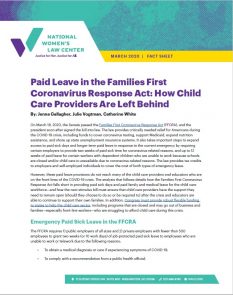On March 18, 2020, the Senate passed the Families First Coronavirus Response Act (FFCRA), and the president soon after signed the bill into law. The law provides critically needed relief for Americans du ring the COVID-19 crisis, including funds to cover coronavirus testing, support Medicaid, expand nutrition assistance, and shore up state unemployment insurance systems. It also takes important steps to expand access to paid sick days and longer-term paid leave in response to the current emergency by requiring certain employers to provide two weeks of paid sick time for coronavirus-related reasons, and up to 12 weeks of paid leave for certain workers with dependent children who are unable to work because schools are closed and/or child care is unavailable due to coronavirus-related reasons. The law provides tax credits to employers and self-employed individuals to cover the cost of both types of emergency leave.
ring the COVID-19 crisis, including funds to cover coronavirus testing, support Medicaid, expand nutrition assistance, and shore up state unemployment insurance systems. It also takes important steps to expand access to paid sick days and longer-term paid leave in response to the current emergency by requiring certain employers to provide two weeks of paid sick time for coronavirus-related reasons, and up to 12 weeks of paid leave for certain workers with dependent children who are unable to work because schools are closed and/or child care is unavailable due to coronavirus-related reasons. The law provides tax credits to employers and self-employed individuals to cover the cost of both types of emergency leave.
However, these paid leave provisions do not reach many of the child care providers and educators who are on the front lines of the COVID-19 crisis. The analysis that follows details how the Families First Coronavirus Response Act falls short in providing paid sick days and paid family and medical leave for the child care workforce—and how the next stimulus bill must ensure that child care providers have the support they need to remain open (should they choose to do so or be required to) after the crisis and educators are able to continue to support their own families. In addition, Congress must provide robust flexible funding to states to help the child care sector, including programs that are closed and may go out of business and families—especially front-line workers—who are struggling to afford child care during this crisis.
